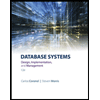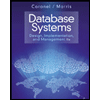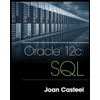
Principles of Information Systems
13th Edition
ISBN: 9781337660556
Author: Ralph Stair; George Reynolds
Publisher: Cengage Learning US
expand_more
expand_more
format_list_bulleted
Concept explainers
Textbook Question
thumb_up100%
Chapter 5, Problem 3DQ
SQL
Expert Solution & Answer
Trending nowThis is a popular solution!

Students have asked these similar questions
Année scolaire: 2024/2025
Collège SMARA
Devoir à domicile 1 semestre 2
Prof: NILAJ
PHYSIQUE CHIMIE
Nom et Prénom:
Niveau: 3APIC
Exercice 1:
Durée: 1 heure
1) Donner la définition des termes suivantes?
Le Mouvement :
La vitesse moyenne:
2) Répondre par « Vrai » ou «>
Un objet peut être en mouvement et au repos
Si la vitesse est constante, le mouvement sera uniforme.
3) Compléter les phrases par les termes qui conviennent :
Pour déterminer le mouvement ou le repos d'un objet, vous devez choisir un autre objet appelé le
d'un point d'un corps mobile est l'ensemble des positions qu'il
occupe durant son mouvement.
Il y a trois types de trajectoires: circulaire.
La distance de freinage dépend de
4) Cocher la bonne réponse?
> La relation entre la vitesse, la distance et le temps:
d
Vm = dxt
> L'unité internationale de la vitesse moyenne est :
m/s
5) On considère la figure suivante :
Compléter le tableau par les mots suivants :
En mouvement au repos
A
C
Km/h
et
et l'
m. s-1
15
A
B
C
Sol…
5. Here is a tree corresponding to T(64) for an unknown recurrence relation:
32 + lg 64
8+ lg 16
2+ lg 4
2+lg4
2+lg4
8+ lg 16
2+lg4
7
7
7
7
7
7
7
7
Fill in the details for the corresponding recurrence relation:
T(n) =
T(n/4)+
T(1)=
Put scratch work below. Scratch work is not graded but may be used for regrade
partial credit.
Top screenshot is question, the rest are examples and explinations.
Chapter 5 Solutions
Principles of Information Systems
Ch. 5.1 - Prob. 1RQCh. 5.1 - Which attribute would you designate as the primary...Ch. 5.1 - Prob. 1CTQCh. 5.1 - Prob. 2CTQCh. 5.2 - Prob. 1RQCh. 5.2 - Prob. 2RQCh. 5.2 - Prob. 1CTQCh. 5.2 - Prob. 2CTQCh. 5.3 - Prob. 1RQCh. 5.3 - Prob. 2RQ
Ch. 5.3 - What additional questions need to be answered...Ch. 5.3 - Prob. 2CTQCh. 5.4 - Prob. 1RQCh. 5.4 - Telefonica Brasil is one of the largest...Ch. 5.4 - Prob. 1CTQCh. 5.4 - Prob. 2CTQCh. 5.5 - Prob. 1RQCh. 5.5 - Prob. 2RQCh. 5.5 - Why is it unlikely that a traditional SQL database...Ch. 5.5 - Prob. 2CTQCh. 5 - Prob. 1SATCh. 5 - Prob. 2SATCh. 5 - Prob. 3SATCh. 5 - The ______________ model is a simple but highly...Ch. 5 - The ability to combine two or more tables through...Ch. 5 - Prob. 6SATCh. 5 - Prob. 7SATCh. 5 - Prob. 8SATCh. 5 - Prob. 9SATCh. 5 - Prob. 10SATCh. 5 - Prob. 11SATCh. 5 - Prob. 12SATCh. 5 - Prob. 13SATCh. 5 - Prob. 14SATCh. 5 - Prob. 15SATCh. 5 - Prob. 16SATCh. 5 - Prob. 1RQCh. 5 - In the hierarchy of data, what is the difference...Ch. 5 - Prob. 3RQCh. 5 - What is meant by data archiving? Why is this an...Ch. 5 - What is an entity-relationship diagram, and what...Ch. 5 - Identify four basic data manipulations performed...Ch. 5 - Prob. 7RQCh. 5 - Prob. 8RQCh. 5 - Prob. 9RQCh. 5 - Prob. 10RQCh. 5 - Prob. 11RQCh. 5 - Prob. 12RQCh. 5 - Prob. 13RQCh. 5 - Prob. 14RQCh. 5 - Prob. 15RQCh. 5 - Prob. 16RQCh. 5 - Prob. 17RQCh. 5 - Prob. 1DQCh. 5 - Outline some specific steps an organization might...Ch. 5 - SQL databases conform to ACID properties. Briefly...Ch. 5 - Prob. 4DQCh. 5 - Prob. 6DQCh. 5 - Prob. 8DQCh. 5 - Prob. 1PSECh. 5 - Describe the role of a database administrator....Ch. 5 - Prob. 2CECh. 5 - Prob. 1CTQ1Ch. 5 - Prob. 2CTQ1Ch. 5 - Prob. 3CTQ1Ch. 5 - Prob. 1CTQ2Ch. 5 - Prob. 2CTQ2Ch. 5 - Prob. 3CTQ2
Knowledge Booster
Learn more about
Need a deep-dive on the concept behind this application? Look no further. Learn more about this topic, computer-science and related others by exploring similar questions and additional content below.Similar questions
- Activity Time (days) Predecessors Earliest Expected Completion Time (TE) Latest Expected Completion Time (TE) 1 4 2 5 1 3456782222 6 1 7 1 4 4 6 2,3 5 3 5 5,7 9 4 7 10 3 6,9 11 5 8,9,10 12 4 11 Slack Critical Path? Yes or Noarrow_forwardI would like to know about the following concepts: 1. defragmentation 2. disk management 3. hardware RAIDarrow_forwardNode.js, Express, and Nunjucks Templates?arrow_forward
- CIT244 Program Project 3 Assignment As with any assigned program, do not wait until the last minute to start. Start early in the week the program is due so you can ask questions if you get stuck Node.js and Express and Nunjucks Templates We have gotten to the good stuff. There is a program similar to this assignment given as the last example in the lecture notes for the week that discusses node static files. This program will take more time that previous assignments. There are several examples you should study first, particularly the pizza order example program available in the examples programs folder for the week discussing static files. You should study and run the pizza order program before trying this program. The pseudo-company is called Sun or Fun, which offers cheap flights from Louisville to either Miami or Vegas. Here's a video of how it should work. NOTE: You will hear or see references to Handlebars in this video. We used to use Handlebars, but it will be Nunjucks that we…arrow_forwardhow to write the expression for the outputarrow_forwardPlease answer the exercise below(C programme)arrow_forward
- I need to list and know about some local storage options available in Windows Server 2019, thank youarrow_forwardPlease answer both Exercise 1 and2(these questions are not GRADED)arrow_forwardDiscussion 1. Comment on your results. 2. Compare between the practical and theoretical results. 3. Find VB, Vc on the figure below: 3V V₁₁ R₁ B IR, R, IR, R www ΙΚΩ www www I 1.5KQ 18₁ 82002 R₁ 3.3KQ R₂ 2.2KQ E Darrow_forward
- Agile1. a. Describe it and how it differs from other SDLC approachesb. List and describe the two primary terms for the agile processc. What are the three activities in the Construction phasearrow_forwardhow are youarrow_forwardneed help with thi Next, you are going to combine everything you've learned about HTML and CSS to make a static site portfolio piece. The page should first introduce yourself. The content is up to you, but should include a variety of HTML elements, not just text. This should be followed by an online (HTML-ified) version of your CV (Resume). The following is a minimum list of requirements you should have across all your content: Both pages should start with a CSS reset (imported into your CSS, not included in your HTML) Semantic use of HTML5 sectioning elements for page structure A variety other semantic HTML elements Meaningful use of Grid, Flexbox and the Box Model as appropriate for different layout components A table An image Good use of CSS Custom Properties (variables) Non-trivial use of CSS animation Use of pseudeo elements An accessible colour palette Use of media queries The focus of this course is development, not design. However, being able to replicate a provided design…arrow_forward
arrow_back_ios
SEE MORE QUESTIONS
arrow_forward_ios
Recommended textbooks for you
 Principles of Information Systems (MindTap Course...Computer ScienceISBN:9781305971776Author:Ralph Stair, George ReynoldsPublisher:Cengage Learning
Principles of Information Systems (MindTap Course...Computer ScienceISBN:9781305971776Author:Ralph Stair, George ReynoldsPublisher:Cengage Learning Fundamentals of Information SystemsComputer ScienceISBN:9781337097536Author:Ralph Stair, George ReynoldsPublisher:Cengage Learning
Fundamentals of Information SystemsComputer ScienceISBN:9781337097536Author:Ralph Stair, George ReynoldsPublisher:Cengage Learning Database Systems: Design, Implementation, & Manag...Computer ScienceISBN:9781305627482Author:Carlos Coronel, Steven MorrisPublisher:Cengage Learning
Database Systems: Design, Implementation, & Manag...Computer ScienceISBN:9781305627482Author:Carlos Coronel, Steven MorrisPublisher:Cengage Learning Database Systems: Design, Implementation, & Manag...Computer ScienceISBN:9781285196145Author:Steven, Steven Morris, Carlos Coronel, Carlos, Coronel, Carlos; Morris, Carlos Coronel and Steven Morris, Carlos Coronel; Steven Morris, Steven Morris; Carlos CoronelPublisher:Cengage Learning
Database Systems: Design, Implementation, & Manag...Computer ScienceISBN:9781285196145Author:Steven, Steven Morris, Carlos Coronel, Carlos, Coronel, Carlos; Morris, Carlos Coronel and Steven Morris, Carlos Coronel; Steven Morris, Steven Morris; Carlos CoronelPublisher:Cengage Learning Fundamentals of Information SystemsComputer ScienceISBN:9781305082168Author:Ralph Stair, George ReynoldsPublisher:Cengage Learning
Fundamentals of Information SystemsComputer ScienceISBN:9781305082168Author:Ralph Stair, George ReynoldsPublisher:Cengage Learning

Principles of Information Systems (MindTap Course...
Computer Science
ISBN:9781305971776
Author:Ralph Stair, George Reynolds
Publisher:Cengage Learning

Fundamentals of Information Systems
Computer Science
ISBN:9781337097536
Author:Ralph Stair, George Reynolds
Publisher:Cengage Learning

Database Systems: Design, Implementation, & Manag...
Computer Science
ISBN:9781305627482
Author:Carlos Coronel, Steven Morris
Publisher:Cengage Learning

Database Systems: Design, Implementation, & Manag...
Computer Science
ISBN:9781285196145
Author:Steven, Steven Morris, Carlos Coronel, Carlos, Coronel, Carlos; Morris, Carlos Coronel and Steven Morris, Carlos Coronel; Steven Morris, Steven Morris; Carlos Coronel
Publisher:Cengage Learning

Fundamentals of Information Systems
Computer Science
ISBN:9781305082168
Author:Ralph Stair, George Reynolds
Publisher:Cengage Learning

SQL Basics for Beginners | Learn SQL | SQL Tutorial for Beginners | Edureka; Author: edureka;https://www.youtube.com/watch?v=zbMHLJ0dY4w;License: Standard YouTube License, CC-BY